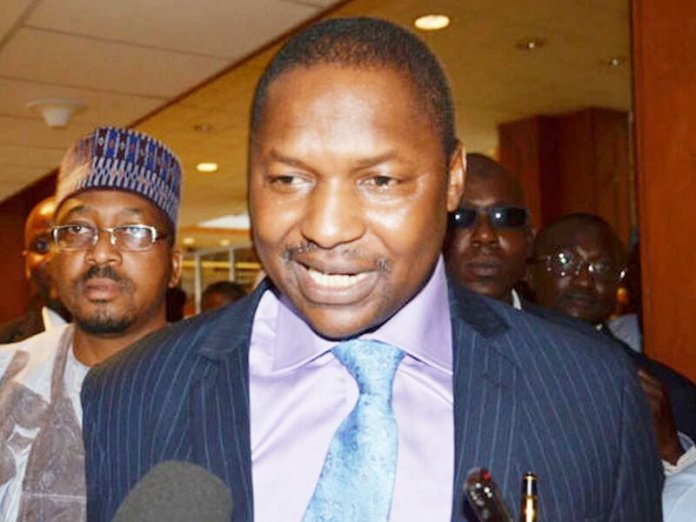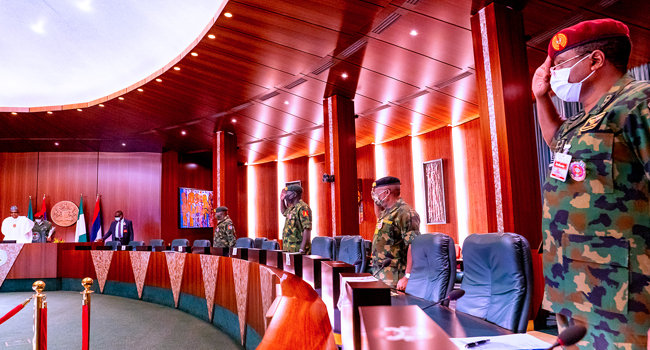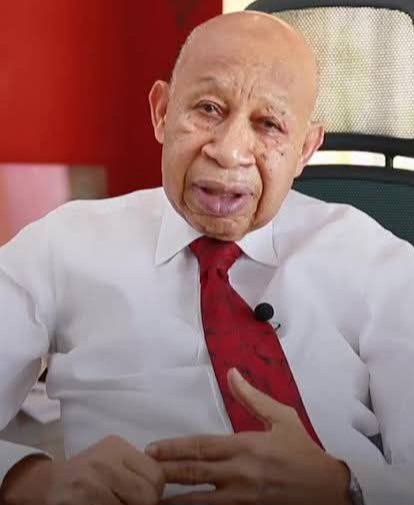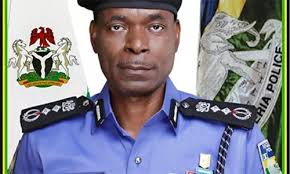Setting Up Of Asset Recovery Committee: My Action In Compliance With Extant Laws, Says Malami

The Attorney General of the Federation and Minister of Justice, Abubakar Malami, has defended the setting up of the Assets Recovery Committee on looted funds.
In a statement issued on Tuesday by his Special Assistant on Media and Public Relations, Dr. Umar Jibrilu Gwandu, the Minister said his action was guided by the extant laws while recently inaugurating the Inter-Ministerial Asset Disposal Committee.
“Attorney General of the Federation and Minister of Justice, Abubakar Malami, SAN acted in compliance with the extant laws including the provisions Economic and Financial Crimes Commission (EFCC) Establishment Act 2004 in setting up the recently inaugurated Inter-Ministerial Asset Disposal Committee,” the statement partly read.
The statement said, “Section 31(1-4) and Sections 43 of the EFFC establishment Act 2004 will not only justify the action of the Minister but also clear doubts on the misconceived and shallow legal analysis in the public space on the legality or otherwise of the committee.”
Malami noted that “lack of understanding of the law was imminent in the wrong impression being created which was fueled by the faulty assumption that only the EFCC is engaged in asset recovery and forfeiture proceedings. Hence the challenge to the setting-up and mandate of the Committee.”
Full Statement Below:
Assets Recovery Committee: Malami Guided by Law
Attorney General of the Federation and Minister of Justice, Abubakar Malami, SAN acted in compliance with the extant laws including the provisions Economic and Financial Crimes Commission (EFCC) Establishment Act 2004 in setting up the recently inaugurated Inter-Ministerial Asset Disposal Committee.
This is contained in a statement issued by Dr. Umar Jibrilu Gwandu, the Special Assistant on Media and Public Relations, Office of the Attorney General of the Federation and Minister of Justice which was made available to newsmen in Abuja on Tuesday 17th day of November 2020.
According to the statement community reading of the provisions of Section 31(1-4) and Sections 43 of the EFFC establishment Act 2004 will not only justify the action of the Minister but also clear doubts on the misconceived and shallow legal analysis in the public space on the legality or otherwise of the committee.
The statement noted that lack of understanding of the law was imminent in the wrong impression being created which was fueled by the faulty assumption that only the EFCC is engaged in asset recovery and forfeiture proceedings. Hence the challenge to the setting-up and mandate of the Committee.
In issuing Regulations and Setting-up Committee for Asset Disposal, the Attorney-General of the Federation was guided, amongst other statutory provisions, by the wordings of Sections 31(4) & 43 of the EFCC Act which confers the Attorney-General of the Federation with the powers to make Rules or Regulations with respect to the exercise of any of the duties, functions or powers of the EFCC (inclusive of asset disposal).
For the avoidance of doubt Section 43 of the EFFC Act provides thus: “The Attorney-General of the Federation may make rules or regulations with respect to the exercise of any of the duties, functions or powers of the commission under this Act.”
It is elementary law that the process of asset forfeiture and disposal constitutes part and parcel of criminal prosecution. It is also trite law that all prosecuting agencies derive their powers to prosecute from that of the constitutional and statutory powers of the Attorney General of the Federation.
The powers of the EFCC is constitutionally subject to the overriding powers of the Attorney-General of the Federation
It is important to note that asset forfeiture and disposal is a continuation of criminal proceedings and in furtherance of the powers conferred on the Hon. Attorney General of the Federation under Section 150(1) of the 1999 Constitution (as amended) as the Chief Law Officer of the Federation, Section 174(1)(b) of the 1999 Constitution (as amended) grants him the exclusive power “to take over and continue any such criminal proceedings that may have been instituted by any other authority or person;”
The Hon. Attorney General of the Federation is therefore on firm legal grounds to regulate the process of asset forfeiture and disposal from the EFCC or any other agency. The Ministries or Departments of Justice worldwide exercises similar powers of asset recovery, forfeiture, management and disposal.
The preeminent constitutional position and scope of the powers of the Hon. Attorney General of the Federation has been laid out in a plethora of judicial decisions such as EZOMO V. A-G, BENDEL STATE (1986) LPELR-1215(SC) Per ANTHONY NNAEMEZIE ANIAGOLU, J.S.C at ( Pp. 18-19, para. E ); Per ADOLPHUS GODWIN KARIBI-WHYTE, J.S.C at ( Pp. 38-39, paras. G-A ); AMADI v. FRN (2008) LPELR-441(SC) Per ALOMA MARIAM MUKHTAR, J.S.C at ( P. 17, paras. B-G ), etc. Indeed in SHEMA & ORS v. FRN (2018) LPELR-43723(SC) MARY UKAEGO PETER-ODILI,J.S.C at ( Pp. 66-74, paras. A-D ) which held that the powers of the Attorney General pursuant to Section 211 of the Constitution of the Federal Republic of Nigeria 1999 (as amended) are not subject to review by any Court of law and there is a surfeit of judicial authorities in that regard such as State v. Ilori (1983) 14 NSCC 69 at 75; George v. FRN (2011) 10 NWLR (Pt. 1254) 1 at 68. The reference to Section 211 above also applies in equal terms to Section 174.
Whilst the Constitution has provided some safety nets on the above incontestable position by providing that the Attorney General shall have regard to the public interest, the interest of justice and the need to prevent abuse of legal process in exercising his powers, the foregoing still remains the Attorney General’s call to make. It is not in doubt that the disposal of forfeited assets is in the best interest of the public and justice. The Attorney General has a total responsibility to control and manage the conduct of criminal prosecutions.
It is, therefore, standing logic on its head for anyone to suggest that a man who is empowered to initiate, takeover and discontinue any criminal proceeding instituted by any person or authority, make Rules for the disposal of forfeited assets and the general operations of the EFCC, and a custodian of public interest, the interest of justice and power to prevent abuse of legal process among others has no power to manage or deal with the outcomes of such proceedings (even when conducted by EFCC) either by way of forfeiture or disposal.
The settled position of the law remains that power or duty conferred by the Constitution cannot be taken away by any other law as such will be declared null and void for inconsistency under Section 1(3) of the 1999 Constitution (as amended). Thus, the powers of the Attorney-General of the Federation in criminal matters generally under the Constitution cannot be circumscribed or taken away by the provisions of Section 31(1-3) & 32(1) of the EFCC Act.
The powers of the Hon. Attorney General of the Federation in the conduct of criminal matters by law enforcement agencies is further emphasized by the following provisions of Section 29(1),105(1-3), 106, 107 & 108 of the Administration of Criminal Justice Act (ACJA). It is quite remarkable to note that Section 268(1) of the ACJA requires a public officer prosecuting in his official capacity in any criminal proceedings to prosecute subject to such direction as may be given by the Attorney-General of the Federation.
The Inter-Agency Committee has, therefore, been constituted in recognition of the relevance and statutory mandates of the listed MDAs and also against the background of the need to provide synergy and coordination amongst all relevant MDAs in the pursuit of the common agenda of the government. While the Committee will not be tied down by these needless distractions, it remains open to positive suggestions.
Dr. Umar Jibrilu Gwandu
(Special Assistant on Media and Public Relations
Office of the Attorney-General and Minster of Justice)
Tuesday 17th November, 2020
– The text was culled from Channels TV (with exception of input in the headline)







